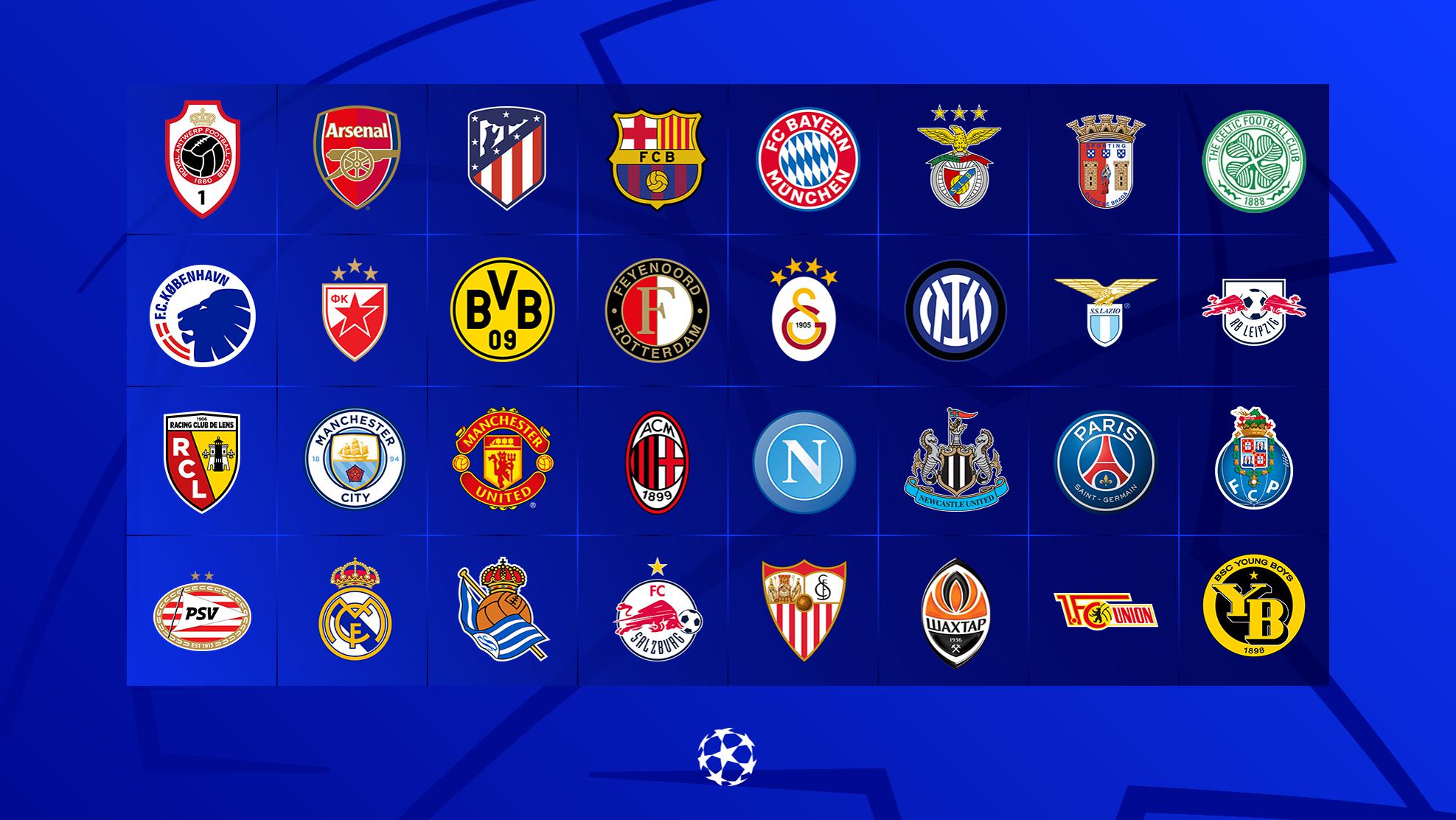Premier League 5 Champions League places: The race for Europe’s elite club competition is a relentless battle, shaping club finances, transfer strategies, and fan fervor. This year’s contest promises heightened drama as traditional powerhouses face unexpected challenges from ambitious underdogs. The stakes are higher than ever, with financial rewards and coveted international glory at stake.
From the inaugural Premier League season to the present day, the quest for Champions League qualification has profoundly impacted the English football landscape. This analysis delves into the historical context, financial implications, strategic adjustments, fan engagement, and future projections surrounding the coveted top five Premier League positions, which guarantee entry into the Champions League. We’ll explore how securing a Champions League spot dramatically alters a club’s trajectory, impacting everything from player recruitment to media attention.
The Premier League’s Pursuit of Champions League Glory: A Deep Dive: Premier League 5 Champions League Places
The Premier League, renowned globally for its intense competition and star-studded players, sees its top teams relentlessly vying for Champions League qualification. This coveted achievement translates to significant financial gains, strategic advantages, and enhanced global recognition. This article delves into the multifaceted impact of Champions League qualification on Premier League clubs, exploring its historical context, financial implications, strategic influences, fan engagement, and future prospects.
Historical Context of Premier League Champions League Qualification
Since the Premier League’s inception in 1992, the number of qualifying teams and the criteria for qualification have evolved. Initially, only the champion automatically qualified. Over time, the number of qualifying teams increased, reflecting the Premier League’s growing global influence and the financial allure of the Champions League. Changes in UEFA regulations, such as the introduction of a fourth qualifying team based on league position, have significantly impacted the competitiveness within the Premier League, creating a more intense battle for top-four, and subsequently top-five, finishes.
For example, the addition of a fourth qualifying team increased the pressure on clubs finishing between fourth and sixth places. The introduction of the Europa League also altered the dynamics, as clubs finishing fifth now have a European competition to contend with, impacting their domestic league performance and preparation for the following season. The shift from four to five qualifying teams represents a major change that increased competition in the upper echelons of the league table.
| Team | Season | Champions League Stage Reached | Notable Players |
|---|---|---|---|
| Manchester City | 2022-2023 | Semi-Final | Erling Haaland, Kevin De Bruyne, Jack Grealish |
| Liverpool | 2022-2023 | Round of 16 | Mohamed Salah, Virgil van Dijk, Darwin Núñez |
| Chelsea | 2022-2023 | Did Not Qualify | N/A |
| Manchester United | 2022-2023 | Round of 16 | Marcus Rashford, Casemiro, Bruno Fernandes |
| Arsenal | 2022-2023 | Round of 16 | Bukayo Saka, Martin Ødegaard, Gabriel Jesus |
Financial Implications of Champions League Qualification

Champions League participation offers substantial financial benefits to Premier League clubs. These benefits extend beyond prize money to include lucrative broadcasting revenue, increased sponsorship deals, and enhanced commercial opportunities. The financial disparity between clubs qualifying and those missing out is considerable, particularly impacting smaller clubs that rely heavily on Champions League revenue to fund their operations and future investments.
- Prize Money: A significant portion of revenue comes directly from UEFA’s prize money distribution, with the amount increasing based on performance in the tournament.
- Broadcasting Rights: Clubs receive a share of the broadcasting revenue generated from Champions League matches worldwide.
- Sponsorship Deals: Champions League qualification significantly enhances a club’s marketability, leading to more lucrative sponsorship contracts.
- Commercial Revenue: Increased global exposure attracts more commercial partnerships and merchandise sales.
Failing to secure a Champions League spot can have severe consequences, potentially impacting a club’s ability to attract top players, invest in infrastructure, and maintain financial stability. The financial gap between Champions League participants and non-participants is a significant factor influencing the competitive balance within the league.
Impact of Champions League Qualification on Premier League Team Strategies
Champions League qualification profoundly influences a club’s transfer market activities, squad management, and tactical approaches. Clubs aiming for Champions League places often prioritize signings that enhance their chances of achieving a top-five finish, potentially sacrificing other areas of the team. Conversely, teams already qualified may adopt different strategies, prioritizing squad rotation to manage player fatigue and injuries across multiple competitions.
For instance, a club fighting for a Champions League spot might prioritize a proven striker over a young prospect with potential, even if it means exceeding their budget. In contrast, a club already in the Champions League might invest in a versatile player who can fill multiple roles, allowing for greater squad flexibility and rotation.
Hypothetical Scenario: Two teams, Team A (fighting for a top-five spot) and Team B (already qualified for the Champions League), approach the final matches of the season differently. Team A will field their strongest possible XI in every remaining game, prioritizing winning to secure a Champions League place. Team B, having already secured qualification, might rotate players to give rest to key players, preparing for the demands of the Champions League.
This approach demonstrates how Champions League ambitions directly impact tactical decisions and team selection.
Check premier league 4 yellow cards to inspect complete evaluations and testimonials from users.
Fan Engagement and Media Coverage Related to Champions League Qualification
The race for Champions League places is a major narrative in the Premier League, generating significant media attention and fan engagement. Media outlets extensively cover the competition, highlighting key matches, analyzing team performances, and speculating on the final standings. Social media platforms become hubs for fan discussions, debates, and predictions, reflecting the passionate interest in Champions League qualification.
- Media Coverage: Newspapers, television channels, and online platforms dedicate extensive coverage to the battle for Champions League spots, often focusing on key fixtures and the implications of results.
- Fan Engagement: Champions League qualification significantly impacts fan engagement and loyalty, with qualified clubs experiencing increased support and merchandise sales.
- Social Media Sentiment: Social media platforms witness a surge in activity during the crucial stages of the season, with fans expressing their opinions, hopes, and anxieties about their teams’ chances.
- Media Attention Disparity: Clubs that secure Champions League places receive significantly more media attention, enhancing their global visibility and attracting new sponsors and fans.
The Competitive Landscape and Future Predictions, Premier league 5 champions league places
Several factors influence a Premier League team’s chances of securing a Champions League place, including squad quality, managerial expertise, financial resources, and injury situations. The current competitive landscape is highly dynamic, with several clubs capable of challenging for a top-five finish. Predicting the future standings is inherently complex, but analyzing historical trends and current form can provide insights into potential scenarios.
- Potential Scenario 1: Manchester City and Arsenal maintain their dominance, securing two of the top-five spots. The remaining three spots could be contested between Liverpool, Manchester United, and a dark horse contender like Newcastle United.
- Potential Scenario 2: A surprise contender emerges, challenging the established top teams. This scenario could see a team like Tottenham Hotspur or Aston Villa unexpectedly securing a Champions League spot.
- Potential Scenario 3: The race remains tight until the final matches, with several teams vying for the remaining Champions League places. This scenario would create a dramatic and unpredictable finish to the season.
Projected Points Needed for Champions League Qualification: Based on past seasons, securing a Champions League spot typically requires accumulating between 75 and 85 points. However, this number can fluctuate depending on the overall competitiveness of the league. In a highly competitive season, teams may need to exceed 85 points, while in a less competitive season, around 75 points might suffice. This variability underscores the unpredictable nature of the Premier League and the intense battle for Champions League qualification.
The fight for Premier League Champions League qualification is a captivating spectacle, a high-stakes drama played out on the pitch and in the boardroom. The financial incentives, strategic implications, and fan passion surrounding this competition shape the very fabric of English football. As the league continues to evolve, the battle for the top five spots will remain a compelling narrative, attracting global attention and driving the relentless pursuit of excellence.


